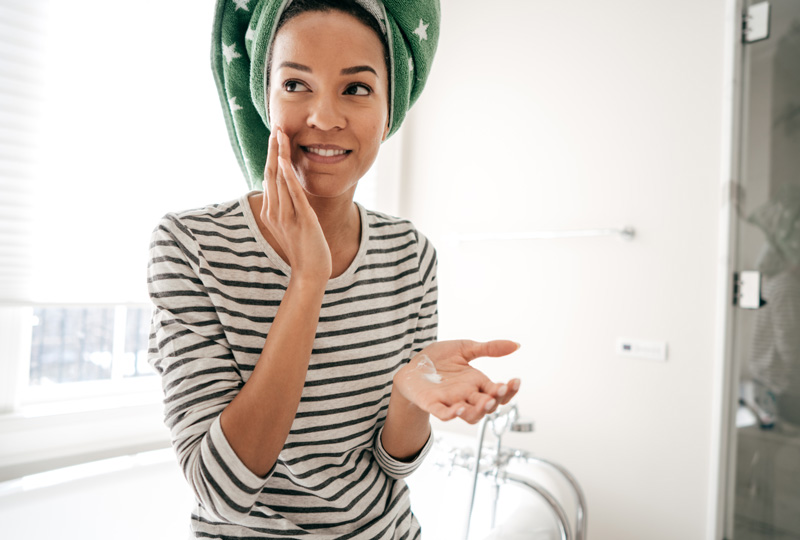A healthy you means healthy, beautiful skin — and vice versa. Here’s what you can do to keep your skin and yourself protected.
We all want our skin to look healthy, young and vibrant. But the importance of skin health goes far beyond aesthetics.
“Your skin is your largest organ and serves as a barrier between you and the big, bad world,” said Eva Parker, M.D., professor of Dermatology at Vanderbilt University Medical Center and a dermatologist with Vanderbilt Dermatology. “Our skin also has a robust immune system that protects us from infections and cancer, and maintaining its health is really critical to ensuring that our skin functions properly — and ensuring that we have beautiful skin.”
She adds that our skin is also the window to our overall health — if we’re healthy, our skin is likely to be healthy, too. But there are things we can do to have healthy skin. According to Parker, here are the things we should be doing every day to ensure we’re setting this critical organ up for success.
1. Stay safe from the sun.
“The number one most important thing is to protect your skin from the sun daily, year-round, no matter what,” Parker said. “UV radiation is present whenever there is daylight, and those damaging UV rays penetrate through the clouds, the car window and even through our regular clothing. Sun protection is not just for summer when you’re outside. It really should be an everyday habit, just like brushing your teeth.”
Parker’s tips:
- For your face, use a broad-spectrum, daily-wear moisturizer that’s at least SPF 30. Apply a similar sunscreen (at least SPF 30) to any other areas that will be exposed. If you’re concerned about chemicals, choose a mineral-based sunscreen.
- For extended outdoor exposure, reapply — at least an ounce! — every 90 minutes.
- If you want to up the ante, add a broad-brimmed hat, sunglasses and sun-protective clothing with a UPF rating of 30-50.
2. Cleanse gently — and never scrub.
“Our skin has a very thin outer layer that’s really critical to skin health — it helps us to maintain the moisture we need in our skin and it acts as a barrier to sun and irritants,” Parker said. “When you take abrasive things — exfoliating scrubs or a mechanical scrubbers like a loofah — you’re stripping away layers that aren’t ready to slough yet. And when you disrupt your skin’s barrier in that way, you negate the benefits of a healthy microbiome.”
Parker’s tips:
- Cleanse your face one to two times a day with a very mild product.
- For the body, avoid long, hot showers and only apply a gentle cleanser to the “stinky folds”: armpits, groin and feet.
3. Moisturize correctly.
“Moisturizing is really important to maintaining the barrier function of our skin,” Parker said. “Even in infants, it’s been shown that proper skincare — applying emollients and maintaining skin barrier — can reduce the risk of developing eczema. It has a really critical role from Day One, but becomes more important as we age, since our skin’s barrier becomes more compromised.”
Parker’s tips:
- Replenish moisture by applying a hypoallergenic, noncomedogenic moisturizer after you bathe or wash your face as well as your body.
- Choose a moisturizer with ceramides, which are natural emollients our skin produces. Using a ceramide-rich moisturizer ensures that your skin will be able to absorb and use the moisture.
4. Drink plenty of water.
“If your cells are dehydrated because you’re not drinking enough water, you can put all the moisturizer in the world on and that’s not going to be enough,” Parker said. “Skin is always going to be more plump and healthy if you’re drinking enough water.”
Parker’s tip:
- Drink 8 glasses — around 64 ounces — of water a day to maintain skin hydration.
5. Fight free radicals.
“Some of the biggest enemies in our skin are free radicals,” Parker said. “Sun and pollution both result in us producing free radicals and reactive oxygen species in our skin, and these are part of a cascade of bad things that lead to dysfunction in our skin barrier and increases in inflammation, wrinkles, brown spots and skin cancer. Antioxidants help combat that.”
Parker’s tips:
- Use an antioxidant every day, such as topical vitamin C or a product containing phenols derived from green tea.
- For more anti-aging benefits, consider a retinol or a prescription retinoid, which are both related to vitamin A. These can help brighten skin, reduce fine lines and improve texture.
6. Eat your veggies.
“Eat a healthy diet, trying to focus on whole foods that are plant-based,” Parker said. “It’s garbage in, garbage out — your skin is not going to be as healthy or as ‘glowy’ as it could be if you’re not following a healthy diet. Eating well and exercising to maintain a healthy weight benefits our cardiovascular system, of course — but downstream we get a lot of benefits for our skin. And for people who have inflammatory skin conditions already, like psoriasis or hidradenitis, the skin can improve just with weight loss alone.”
Parker’s tips:
- Maximize your intake of vegetables, fruits and whole grains.
- Minimize processed foods and sugar.
7. Reduce stress.
“Stress increases inflammation,” Parker said. “It also exacerbates conditions like psoriasis and eczema, can contribute to the development of acne and hives, and interfere with proper immune function. Ultimately, a healthy mind contributes to a healthy body, and that’s certainly true of the skin.”
Parker’s tip:
- Get ample sleep, and aim to reduce stress through exercise and mindfulness practices.

Vanderbilt Dermatology offers a full range of services to get your skin healthy and keep it healthy. We offer many noninvasive therapies, such as medication and light treatments, for a wide range of conditions. To make an appointment with one of our specialists, call 615-322-6485.

